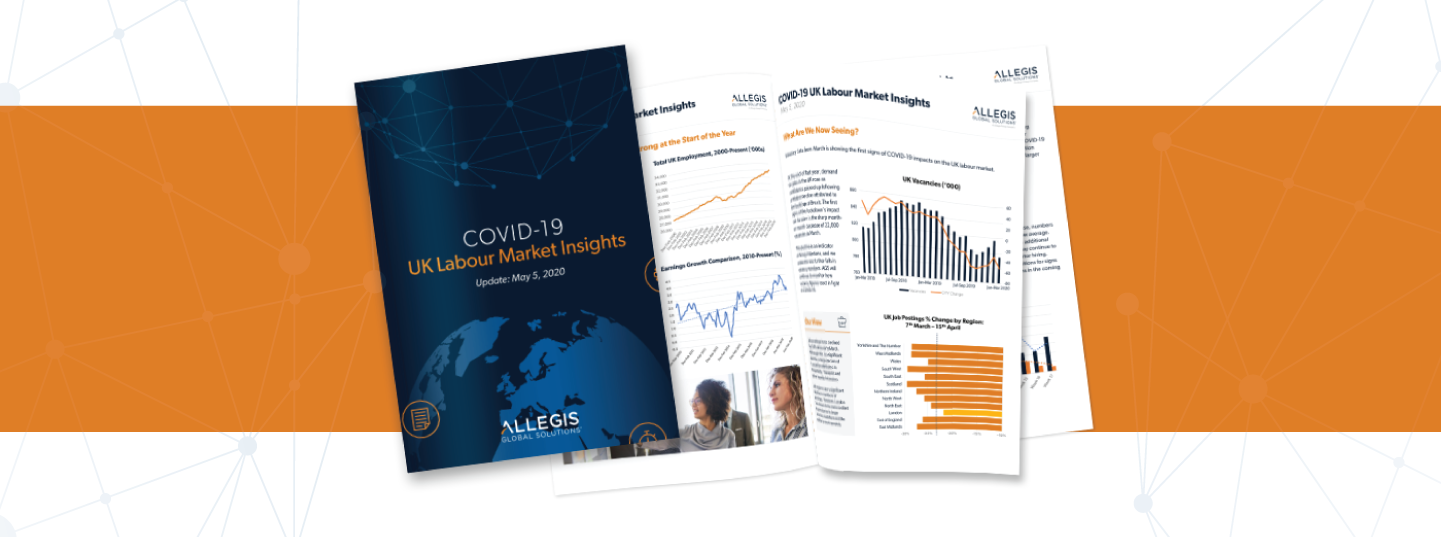What Does UK Workforce Data Mean for a COVID-19 Recovery?
 In its recent UK Labour Market Insights report, Allegis Global Solutions (AGS) draws from market and client data on employment growth, open job requisitions, and new contractor starts to shed light on changing market conditions. As the numbers show, businesses are showing a greater reaction to the COVID-19 pandemic than initial data portrayed.
In its recent UK Labour Market Insights report, Allegis Global Solutions (AGS) draws from market and client data on employment growth, open job requisitions, and new contractor starts to shed light on changing market conditions. As the numbers show, businesses are showing a greater reaction to the COVID-19 pandemic than initial data portrayed.
Data aggregated from AGS’ business activity and external sources finds that job requisition activity in early March saw relatively little change, but now open requisitions are down 30 percent since the UK lockdown was announced. The change means companies will likely be setting a course for more cautious hiring in the coming months.
Navigating the winding road ahead requires an informed view of both the challenges and opportunities that are likely to emerge. The following are key takeaways for talent decision-makers based on the latest information.
Delayed Impact May Expand Timelines for Workforce Changes
As the UK strives to control the spread of COVID-19, it is also looking to reduce the immediate economic impact of the pandemic. The most prominent effort in this area is the UK government’s Job Retention Scheme. The scheme enables employers to furlough workers in employment prior to March 19 and guarantee 80 percent of wage costs up to £2,500 per month per worker through the end of October. Self-employed workers will also be eligible for similar support through a related program.
This scheme will help to slow the rise in unemployment, giving companies an option other than laying off workers. Employees may have the added security they need to stay in place through the uncertainty, so companies may experience some challenges filling roles and securing new talent. Expanding timelines for hiring may be required for this environment, but a talent solutions partner can accurately set expectations and help determine a path toward securing the best talent moving forward.
Expect Significant Variations in Talent Supply and Demand
Heavily impacted sectors such as Hospitality and Transportation make up much of the decline in job postings, but the losses are not evenly spaced. London experienced a smaller percentage fall, mostly due to its larger services-based workforce with less of a dependence on onsite work. Job postings are down across all occupational groups, but Healthcare has seen a recent increase. Declines on the month range from 15 percent for scientific roles to a full 30 percent for production-related roles.
This data reveals that companies should not assume that the overall economic slowdown will automatically deliver more talent availability for their sectors; this will depend heavily on the types of roles being sourced, where they are being sourced, and the influence of the jobs scheme provided by the government. However, the rules of talent engagement will still apply: be proactive in hiring plans, go into the market with a view of the talent supply, be competitive in engaging candidates, and focus on retaining current workers.
Contractor Rates May Not Move Quickly
Similar to the pandemic’s reduced impact on unemployment, the effects on actual worker earnings will be slow to emerge, if they appear at all. The reason why is twofold. First, the previously mentioned government schemes provide a cushion that reduces the influx of unemployed workers into the talent supply. Second, the variable impact on different industries, locations, and skills means that the resulting changes in pay will not be universal. Also, the current crisis comes on the heels of an extremely healthy year for worker earnings. In 2019, the UK saw the highest earnings growth in more than a decade, and even as late as February, earnings were still up by 2.8 percent over the year.
Companies will need to pay close attention to the rates they are offering based on skills and location. The right talent solutions partner can leverage data to keep a close eye on market activity and best understand which rates will deliver the best-fit talent in the right timeframe.
Redeployment and Reskilling Will Gain Attention
Employers may be well served to take a second look at how they approach talent redeployment. Even as markets change, a company’s greatest asset is often its current workforce. By stepping up and preserving their employment in challenging situations, companies can develop a workforce that is engaged, agile, and willing to navigate the changes ahead.
Thinking outside traditional career paths can make the difference between a lost worker and a new opportunity to build the strength of the organization. The same can be said of talent suppliers and the contractors they place. In the most innovative organizations, workers with all skill types and backgrounds have the opportunity to guide their careers. Once again, a committed talent solutions partner can help develop an informed strategy for positioning every worker to deliver a positive and lasting impact for the organization.
Don't Replace Vision with Reaction
As organizations in the UK and around the world wrestle with the impacts of the pandemic, some are forced to react with rapid turns in strategy and cuts to the workforce. While making cuts can yield some positive near-term cost-impact, many organizations are taking a balanced approach to ensure they are positioned to succeed as markets improve.
The key to that balanced approach is to remove as much guesswork as possible from any workforce decision. What’s available today, at what cost, and how does talent align with company strategy? These are questions a talent solutions partner can help answer, and their visibility into the market can prove crucial in positioning an organization not only to survive but lead through the pandemic.
Get data-driven insights for strategic business and talent decisioning today.
-min.png)




